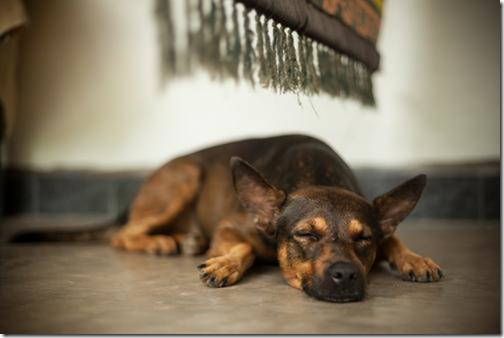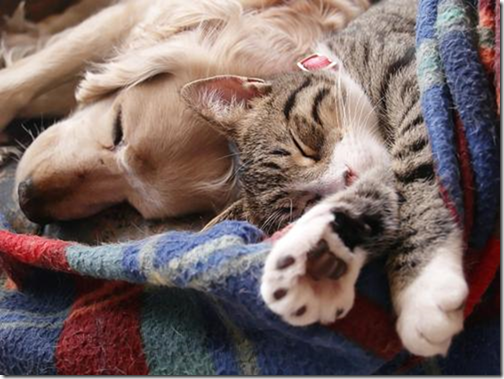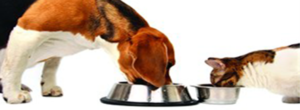If you’re a dog owner who allows your dog to sleep with you at night, don’t feel guilty or weird. According to an American Kennel Club survey, 45% of dog owners allow their dogs to sleep in their bed with them. So this is perfectly normal … even if non-dog owners can’t seen to understand.
Losing Sleep with the Dog
If you’re going to have the dog sleep in your bed, it’s important that you don’t allow any restlessness from the dog to keep you awake at night. It doesn’t take much movement from the dog to jostle the bed and wake up light sleepers. Likewise, it doesn’t take much movement from you in the bed to jostle the dog, which will then shift positions and wake you up again.
You get the picture.
While many dogs sleep comfortably in a larger, human-sized bed, others may have a difficult time remaining still during the night, especially if they have some kind of sleeping disorder. And the last thing you want is to end up having a poor night’s sleep because your dog wasn’t able to sleep comfortably. Two different sleeping disorders can occur within any breed of dog, causing the dog to sleep poorly at night … and also causing you to lose sleep.
● Insomnia. A dog that just can’t seem to sleep at night could be suffering from insomnia. A dog with this disorder may constantly move around the bed, leaving you with a restless night. Additionally, however, a dog with thyroid problems or kidney problems could show symptoms of insomnia, so you’ll want to have the dog examined by a veterinarian.
If your dog seems to be suffering from a lack of sleep, remember that the cause may not be a sleeping disorder at all, but could be as simple as an illness or sense of unease. This can be caused by anything from disliking a change of routine to toxic chemicals in pet food. This is why it pays to be vigilant not just about your dog’s sleeping patterns, but day-to-day behavior as well.
Also make sure to look at the ingredients used in your pet’s food, and if you see processed sugar near the top of the list, your dog may be ingesting enough sugar that it feels jittery and restless, just as you might feel after eating a lot of sugar, while attempting to sleep. A large amount of grains in the food can cause the same problem over time.
Make sure you’re giving your pet natural dog food to help its overall health, including sleep problems. And if you cannot find a manufacturer’s commercially produced food that fits your dog’s health needs, consider making your own dog food. It is a time consuming process, but you’ll appreciate the peace of mind it gives you and your furry friend!
● Sleep apnea. While you may think of sleep apnea as a disorder that only strikes humans, a dog can also suffer from sleep apnea. The dog will be unable to sleep well, because it will temporarily stop breathing during sleep, causing it awaken multiple times throughout the night. And a dog suffering from sleep apnea will snore loudly, causing you to have a difficult time sleeping.

If your dog seems to be suffering from a lack of sleep, remember that the cause may not be a sleeping disorder at all, but could be as simple as an illness or sense of unease. This can be caused by anything from disliking a change of routine to toxic chemicals in pet food. This is why it pays to be vigilant not just about your dog’s sleeping patterns, but day-to-day behavior as well.
Also make sure to look at the ingredients used in your pet’s food, and if you see processed sugar near the top of the list, your dog may be ingesting enough sugar that it feels jittery and restless, just as you might feel after eating a lot of sugar, while attempting to sleep. A large amount of grains in the food can cause the same problem over time.
Make sure you’re giving your pet natural dog food to help its overall health, including sleep problems. And if you cannot find a manufacturer’s commercially produced food that fits your dog’s health needs, consider making your own dog food. It is a time consuming process, but you’ll appreciate the peace of mind it gives you and your furry friend!

Dogs That Sleep Too Much
Some dog owners may be concerned that their dog is having the opposite problem: too much sleep. After all, it may seem like your dog is asleep every time you see it, whether it’s on your bed, on the couch, or in the backyard.
It’s worth noting that an average dog sleeps 12-14 hours per day. Because this is quite a bit more sleep than a human needs, it may seem like the dog is sleeping constantly. In reality, your dog could be sleeping a normal amount. And if you own a puppy, an older dog, or a large breed, the dog may sleep up to 18 hours per day.
If you find your dog is sleeping a lot more than usual during the day though, it could be indicating some sort of illness. A problem like narcolepsy is rare in a dog, but it does occur occasionally. Or if the dog is very tired all day, it could indicate the dog isn’t sleeping well at night, which you might not notice if the dog isn’t sleeping in your bedroom.
If you’re concerned that your dog is sleeping too much, keep an eye on your pet. Take some notes on how your dog’s sleeping habits are changing, and then see whether the vet has any ideas to help both of you sleep well throughout the night.
Article submitted by Amber Kingsley.
Amber is a journalist as well as a lifetime pet lover. When she’s not traveling the world, she’s usually spending time at home with her pets, and wants to help others make sure that their pets are as happy as they can be.







